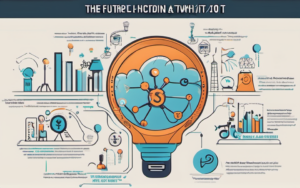The rapid pace of technological advancement is transforming every aspect of our lives, and the future workforce is no exception. Emerging technologies like artificial intelligence, automation, and cloud computing are reshaping industries, creating new opportunities, and demanding new skills. To thrive in this evolving landscape, individuals and organizations need to understand the trends shaping the future of work and prepare for the skills and demands of tomorrow.
The Impact of Emerging Technologies on the Workforce
Emerging technologies are fundamentally changing the nature of work, creating both challenges and opportunities. One of the most significant impacts is the rise of automation and artificial intelligence.
Automation and Artificial Intelligence
Automation and artificial intelligence (AI) are rapidly transforming industries, automating tasks previously performed by humans. This can lead to increased efficiency and productivity, but it also raises concerns about job displacement. While some jobs may become obsolete, others will emerge, requiring different skill sets.
For example, in manufacturing, robots are increasingly performing repetitive tasks, freeing human workers to focus on more complex and creative roles. AI is also being used to analyze vast amounts of data, helping businesses make better decisions and improve customer service.
Data Science and Analytics
The explosion of data generated by businesses and individuals has created a growing demand for data scientists and analysts. These professionals are equipped with the skills to collect, clean, analyze, and interpret data, providing valuable insights to organizations.
Data science and analytics play a crucial role in decision-making, marketing, product development, and many other areas. As businesses increasingly rely on data-driven insights, the demand for these skills will continue to rise.
Cloud Computing and Cybersecurity
Cloud computing has become ubiquitous, enabling businesses to store and access data and applications remotely. This has led to the need for cloud computing professionals who can manage and maintain cloud infrastructure, ensuring security and reliability.
Cybersecurity is another critical area, as businesses increasingly rely on technology to protect sensitive data from cyberattacks. Cybersecurity professionals play a vital role in safeguarding networks, systems, and data, ensuring business continuity and protecting customer privacy.
Skills in Demand for the Future Workforce
To succeed in the future workforce, individuals need to acquire the skills that are in high demand and adapt to the evolving needs of the job market. These skills can be broadly categorized into technical, soft, and adaptability skills.
Technical Skills
Technical skills are essential for working with technology and data. These include:
- Programming and coding: Proficiency in programming languages like Python, Java, and JavaScript is crucial for developing software applications, analyzing data, and automating tasks.
- Data analysis and visualization: Skills in data analysis and visualization using tools like Tableau, Power BI, and R are essential for extracting meaningful insights from data and communicating findings effectively.
- Cybersecurity: Expertise in cybersecurity, including network security, ethical hacking, and incident response, is crucial for protecting organizations from cyber threats.
Soft Skills
While technical skills are essential, soft skills are equally important for success in the future workforce. These include:
- Communication: Effective communication skills, both written and verbal, are essential for collaborating with colleagues, clients, and stakeholders.
- Problem-solving: The ability to analyze problems, develop solutions, and implement them effectively is highly valued in the future workforce.
- Creativity and innovation: As automation takes over repetitive tasks, creative thinking and innovation will be increasingly important for driving business growth and finding new solutions.
Adaptability and Lifelong Learning
The rapid pace of technological change demands adaptability and lifelong learning. The skills that are in demand today may not be relevant tomorrow. Therefore, individuals need to be willing to learn new skills and adapt to changing job requirements.
This includes staying updated with the latest technologies and trends, being open to new experiences, and continuously seeking opportunities for personal and professional growth.
The Future of Work: Trends and Predictions
The future of work is constantly evolving, shaped by technological advancements, changing demographics, and evolving work styles.
Remote Work and Flexible Schedules
The rise of remote work and flexible schedules has been accelerated by the COVID-19 pandemic. Many companies have embraced remote work, allowing employees to work from anywhere with an internet connection. This trend is expected to continue, offering greater flexibility and work-life balance.
The Rise of the Gig Economy
The gig economy, which involves temporary or freelance work, has been growing steadily. Workers in the gig economy have the flexibility to choose their projects and set their own schedules. This trend is expected to continue, as more people seek greater autonomy and control over their work.
The Importance of Human-Centric Design
As automation and AI become more prevalent, the importance of human-centric design will increase. This involves designing technologies and work processes that prioritize the needs and well-being of human workers. It emphasizes collaboration between humans and machines, leveraging the strengths of both to achieve optimal results.
Preparing for the Workforce of the Future
To prepare for the workforce of the future, individuals and organizations need to take proactive steps to adapt to the changing landscape.
Education and Training
Investing in education and training is crucial for acquiring the skills needed for the future workforce. This includes pursuing higher education, professional certifications, and online courses that align with emerging technologies and industry demands.
Upskilling and Reskilling
As the job market evolves, individuals need to continuously upskill and reskill to remain competitive. This involves learning new technologies, developing new skills, and adapting to changing job requirements. Many organizations offer training programs and resources to support employee development.
Embracing Change and Innovation
The future workforce requires a mindset that embraces change and innovation. This means being open to new ideas, experimenting with new technologies, and adapting to evolving work practices.
Organizations need to create cultures that encourage experimentation, learning, and continuous improvement. This includes fostering a collaborative environment, providing employees with opportunities for growth, and rewarding innovation.
The future workforce will be characterized by technological advancements, evolving skills, and new ways of working. By understanding the trends shaping the future of work, preparing for the skills in demand, and embracing change and innovation, individuals and organizations can navigate this dynamic landscape and thrive in the years to come.




